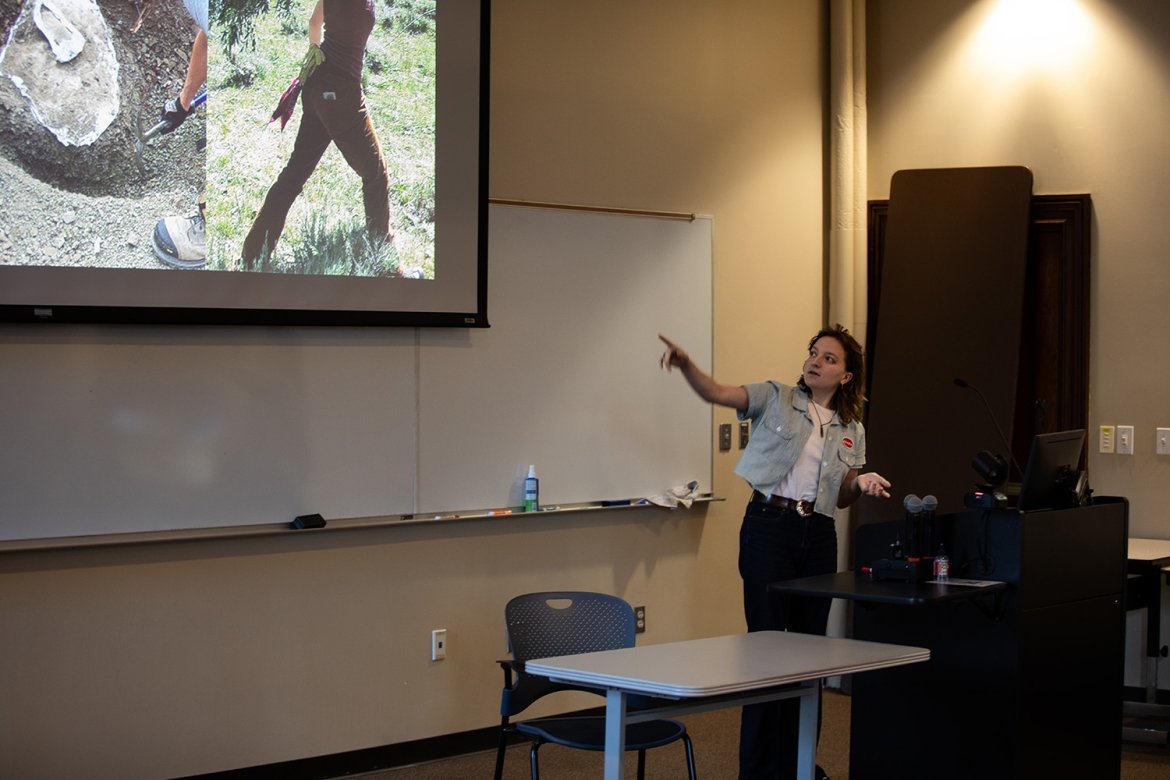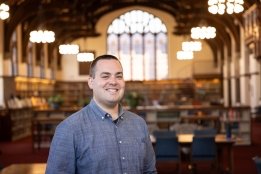Students explore future environmental career possibilities

Taking part in a two-day workshop featuring alums, staff and current interns, Mount Holyoke College students had the opportunity to learn what a career in environmental work entails and how to get on the right track to start their own journeys.
As the world continues to grapple with the effects of climate change, the need for college graduates to enter the environmental and sustainability field has never been greater. For Mount Holyoke College students interested in this area, the Career Development Center, the Department of Environmental Studies, the Miller Worley Center for the Environment and the Department of Geology and Geography held a joint two-part workshop on September 30 and October 1 to explore future possibilities in environmental careers.
The first part of the workshop on Monday September 30 featured alums from the departments of Environmental Studies and Geology and Geography who are now working in the fields of environmental and sustainability. They shared some of their real-world experiences, including how some positions made them realize they would choose a different direction than they intended. This was the case for Maahi Jaiswal ’24, whose summer research experiences for undergraduates gave her an appreciation for the system work that’s conducted outside of labs.
“I think in my case, my REU made me realize that while working in the lab is really fun, I don't think it's for me, and I think I'd want a different working style and working space,” said Jaiswal. “Also, what I was researching was really science-heavy. I think I was more interested in the overarching system of ‘why is this a problem?’ I was studying food science, specifically E-coli, and all of these issues where E-coli enters the stream of agriculture. So, I was more interested in the system aspect of it.”
Carly Peltier ’15, who graduated with a double major in economics and geology before going on to Columbia University for her doctorate, advised current students to not only expand their field but also make connections.
“I think getting an internship or some kind of experience in different fields is super helpful,” said Peltier. “The other thing you could do, since you can't do a million internships, is coffee chats; people are usually really willing to take 20 minutes to do an in-person or virtual coffee chat with you. It's a lot easier to ask sometimes rather than ‘here's my résumé.’ I think it's a good way to hear from folks about their experiences in different fields.”
Erin Pierce ’15, who majored in environmental studies with a concentration in ecosystem science and a minor in computer science, spent some time talking about mentorship and explaining how it has influenced her career in environmental work.
“Just asking for advice is more than necessarily an ongoing sustained thing, and then keep in touch with people,” said Pierce. “I keep reading the Laurel Chain, and whenever I see restoration ecology programs, I think it’s great. I reached back out to my mentor while I was in grad school and talked to her about some stuff. So try to stay connected or at least follow the people whose work you admire or who were influential to you.”
Mount Holyoke College students continued their workshop on Tuesday, October 1 with an in-person session in Dwight Hall. Angelica Patterson, the curator of education and outreach for the Miller Worley Center for the Environment, presented about field assignments and their significance for undergraduates. About 88% of environmentally based employers value geoscience field education and believe it should be a fundamental requirement in undergraduate programs. According to Patterson, fieldwork is just one branch of technical skills with office and lab work being the other two branches. Current Mount Holyoke students who are currently completing internships were also on hand to discuss their experiences in fieldwork.
“When you sign up for fieldwork, especially in a public lands position like with the Bureau of Land Management, there can be a lot of things you don't expect,” said Piper Hattenbach ’25 of Washington, D.C. “And I think if I had to give anybody any advice, it would be to take those opportunities and try to give yourself the chance to learn the things you never knew or you thought were going to get to work.”
Hattenbach’s summer fieldwork program falls under the direct hire authority designation, meaning that the Bureau of Land Management can hire her directly after graduation — something she says is possible at several other government entities, such as the National Parks Service.
Zoey Pickett ’26 of Casper, Wyoming, was on hand to discuss her fieldwork with the Vermont Center for Ecostudies.
“I figured I would apply for it, and then I got it, and then I thought, ‘Oh my gosh, this is amazing,’” said Pickett. “And I think one of the best things that I got out of it was meeting people in the field. I got to interact with people at the UMass biology department, Biodiversity Research Institute in Maine, Audubon Vermont, University of Vermont and the Vermont Institute of Natural Science. So, I met a bunch of people that were all so nice, also learning about the different positions of fieldwork.”
